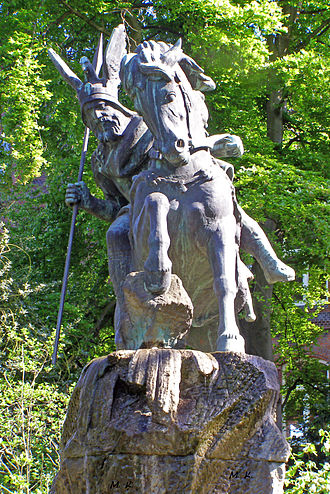Meet the Etymology Guy

Statue of Saxon leader Widukind in Herford, Germany. (Image by M. Kunz)
Every November 5, the United Kingdom celebrates Guy Fawkes Night. Guy Fawkes was an Englishman who attempted to blow up the House of Parliament in 1605. The story is fairly well known—but why was this guy named Guy? What kind of a name is that, anyway? As it turns out, it’s kind of a long story!
Proto-Germanic, the reconstructed ancestor language of Germanic languages such as English and German, had a word *widuz ‘wood’—this, in fact, is the source of the English word wood. This root was used in names such as Old Saxon Widukind, literally ‘child of the wood’. These names could be shortened to Wido. The short form was borrowed into Old French as the name Guy and into Italian as Guido. The initial g-sound was added to fit the sound pattern of these languages; neither allowed w at the beginning of a word, and borrowed words originally beginning with w were pronounced with g. (The same process is evident in French guerre and Italian guerra ‘war’, which derive from a Frankish word similar to English war.)
After the Norman conquest of England in 1066, many Norman French loanwords entered Middle English. One of these was the name Guy, at the time pronounced [ɡiː] (like ghee). The word is now pronounced [ɡaɪ] because several centuries later, the Great Vowel Shift altered the pronunciation of long vowels throughout English. At the time of Guy Fawkes, this change in the name’s pronunciation had already occurred.
I don’t know how common the name Guy was in England, but after Guy Fawkes’s failed plot, he likely became the most famous Guy who had ever lived. The Oxford English Dictionary dates the first attestation of the common noun guy to 1806, meaning ‘an effigy of Guy Fawkes traditionally burnt on the evening of November the Fifth’. By extension, it came to mean ‘a person of grotesque appearance, especially with reference to dress’. The generic meaning of guy as ‘man’ is first attested in 1847; the OED notes that it was initially restricted to the US and later spread.
Why should a word meaning a person of grotesque appearance come to simply mean ‘man’? It’s hard to say for certain, but similar cases of semantic change have been observed elsewhere. For example, dog and bird used to refer to specific kinds of dogs and birds, but now mean any dog or bird; thing used to mean a council or assembly (as in the Icelandic Alþingi), but now means—well, anything.
Since the mid-20th century, the expression you guys has entered common usage as an informal second-person plural pronoun, comparable to the American regional variants y’all and youse. For many speakers, this usage now includes all genders, although guy remains male.
It’s fascinating to see how this one word has had so many twists and turns over the centuries. Whatta guy!